August 29, 2014
by Carole Zangari -

Are you trying to convince a team that core words are the way to go? Have you done all the usual things, like shared some of the research and demonstrated its utility? Maybe it will help if you tell them that this approach isn’t some new-fangled idea, but rather one that has been around for awhile. How long? Probably longer than you think. Check out this picture from the 1960’s tweeted by #WeSpeechies. Goldberg, H.R., & Fenton,J. (1960). Aphonic Communications for Those with Cerebral Palsy: Guide for the Development and Use of Conversation Board. NY: United Cerebral Palsy Association New York State.
Filed under: PrAACtical Thinking
Tagged With: #WeSpeechies
August 28, 2014
by Carole Zangari -
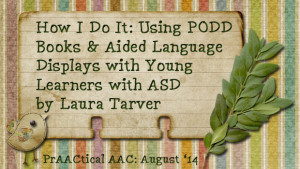
Today, we turn to the UK in a guest post by Laura Tarver. a London-based Speech and Language Therapist working with children with ASD and other complex needs. She previously worked in a primary school for children with ASD, where PODD and Aided Language Displays were introduced as part of a school wide approach in order to enhance the communication-friendly environment for all pupils. In this post, she shares how they used PODD books and aided language input to build the students’ communication skills. :::::::::::::::::::::::::::::::::::::::::::::::::::::::::::::::::: PODD (or Pragmatic Organisation Dynamic Display) communication books were developed in Australia by Gayle Porter, originally for children with cerebral palsy. As their use becomes more widespread throughout the world, practitioners are considering the benefits of using them with other clinical populations. Their structured organisation and emphasis on visual communication means that they are also a valuable tool for developing the communication of those with... [Read More...]
Filed under: PrAACtical Thinking
Tagged With: aided language input, communication book, Laura Tarver, PODD
August 27, 2014
by Carole Zangari -
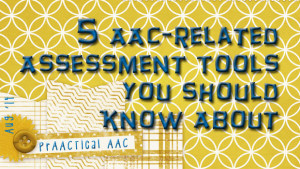
It’s the beginning of a new semester for us, and that got us thinking about assessment for our new and returning clients with AAC needs. Here are some of the tools we’ll be thinking about over the next few weeks. AAC Profile: A Continuum of Learning (Kovach, 2009) Checklist of Communication Competencies, Revised (Bloomberg, West, Johnson, & Iacono, 2009) Functional Communication Profile, Revised (Kleiman, 2003) Social Networks: A Communication Inventory for Individuals with Complex Communication Needs and Their Partners (Blackstone & Hunt Berg, 2012) The Test of Aided-Communication Symbol Performance (TASP; Bruno, 2010) ::::::::::::::::::::::::::::::::::::::::::: Blackstone, S., & Hunt Berg, M. (2012). Social Networks: A Communication Inventory for Individuals with Complex Communication Needs and Their Communication Partners. Verona, WI: Attainment. Bloomberg, K., West, D., Johnson, H., & Iacono, T. (2009). Triple C Manual and Checklists, Revised. SCOPE: Victoria. Bruno, J. (2010). Test of Aided-Communication Symbol Performance. Pittsburgh, PA: Dynavox Mayer Johnson. Kleiman,... [Read More...]
Filed under: PrAACtical Thinking
Tagged With: assessment, testing, tests
August 26, 2014
by Carole Zangari -
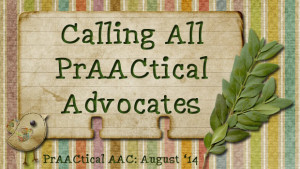
US Colleagues: It’s not too late! We still need your help to tell Congress and Health and Human Services Secretary Sylvia Burwell, to stop denying our most vulnerable disabled people their ability to communicate! The initial advocacy effort was effective in delaying the start date for implementation of the proposed changes but more needs to be done. New to these issues? Check out the post by Bill Binko here. Basically, Medicare has announced several changes to its speech generating device coverage policies that will be devastating to people with complex communication needs. To protect our clients, we believe the Secretary of Health and Human Services, the most senior official responsible for Medicare policy, must be made aware of the harmful effects of these changes and must be asked to reverse them. We must speak up now to ensure our clients also will be able to. You can call Medicare directly to... [Read More...]
Filed under: PrAACtical Thinking
Tagged With: advocacy, Amy Goldman, funding, Lew Golinker, Medicare, Melanie Fried-Oken, patient provider communication
August 23, 2014
by Carole Zangari -
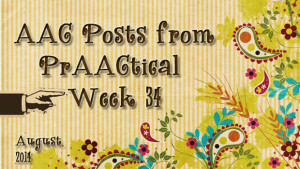
Sunday-Video of the Week: PODD in the ASD Classroom Monday-Something to Say Tuesday-PrAACtical Resources on Communication and Autism Wednesday-PrAACtical Resources on PODD & Partner Assisted Scanning Thursday-PrAACtical Resources on the SETT Framework Friday-PrAACtical Resources on AAC & Language Therapy
Filed under: PrAACtical Thinking
August 22, 2014
by Carole Zangari -
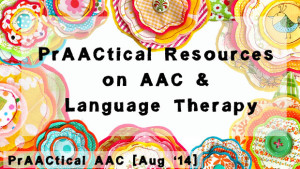
While we’re on vacation, take a look at some of the resources we’ve collected on AAC and language intervention.
Filed under: PrAACtical Thinking
Tagged With: language therapy
August 21, 2014
by Carole Zangari -
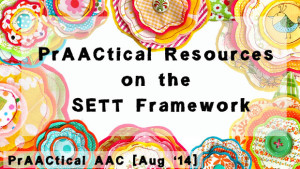
Want to explore resources on the SETT Framework?
Filed under: PrAACtical Thinking
Tagged With: SETT
August 20, 2014
by Carole Zangari -
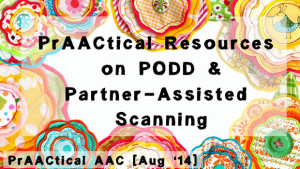
Some resources to explore…
Filed under: PrAACtical Thinking
Tagged With: partner assisted scanning, PODD
August 19, 2014
by Carole Zangari -
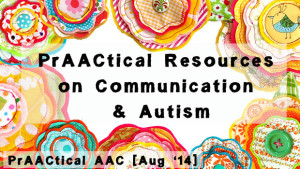
It’s vacation time! While we catch up with friends and family, here are some resources to peruse.
Filed under: PrAACtical Thinking
Tagged With: ASD
August 18, 2014
by Carole Zangari -
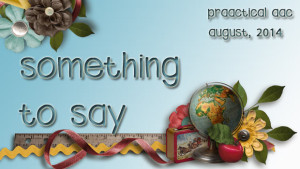
It takes practice to pause, but so worth the effort.
Filed under: PrAACtical Thinking
Tagged With: pause, wait









